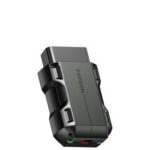For car enthusiasts and mechanics working with a mix of vehicles, the question of compatibility between different diagnostic systems often arises. Specifically, with older cars utilizing the OBD1 standard and newer tools and scanners designed for OBD2, a common question is: Is There An Adapter Between Obd2 And Obd1? The short answer is yes, OBD2 to OBD1 adapters do exist. However, the functionality and effectiveness of these adapters are not always straightforward. Let’s delve into what these adapters are, what they can do, and what limitations you should be aware of.
Understanding OBD1 and OBD2
Before exploring adapters, it’s crucial to understand the fundamental differences between OBD1 and OBD2. OBD, or On-Board Diagnostics, is a standardized system for vehicle self-diagnostics and reporting.
OBD1 was the early generation, implemented differently by various manufacturers, leading to a lack of standardization in connectors, communication protocols, and the data provided. You might find different pin configurations and diagnostic procedures even between models from the same manufacturer in the OBD1 era.
OBD2, mandated in the United States in 1996, brought much-needed standardization. It features a standard 16-pin Diagnostic Link Connector (DLC), standardized diagnostic trouble codes (DTCs), and improved data reporting capabilities. This standardization made it easier for mechanics and DIYers to diagnose a wider range of vehicles with universal tools.
The Role of OBD2 to OBD1 Adapters
OBD2 to OBD1 adapters are essentially physical connector converters. They bridge the gap between the OBD1 connector in your older vehicle and the OBD2 connector of modern diagnostic scanners. These adapters do not magically upgrade your OBD1 system to OBD2. They primarily change the shape and pinout of the connector to allow you to physically plug in an OBD2 scanner.
What Can You Expect from an OBD2 to OBD1 Adapter?
With an adapter, you might be able to connect a generic OBD2 scanner to an OBD1 vehicle. In some cases, this might allow you to read basic diagnostic trouble codes, if the older vehicle’s computer system is somewhat compatible with the communication protocols the OBD2 scanner attempts to use.
However, it’s important to set realistic expectations. Here’s what adapters often cannot do:
- Full OBD2 Functionality: Adapters do not provide full OBD2 capabilities on an OBD1 system. You won’t suddenly gain access to the expanded data parameters, live sensor readings, or advanced diagnostic features of OBD2.
- Protocol Conversion: These adapters are typically passive devices. They do not convert the communication protocols. If your OBD2 scanner relies on OBD2 protocols that the OBD1 system doesn’t understand, the adapter alone won’t solve this incompatibility.
- Manufacturer-Specific Codes: OBD1 systems often relied heavily on manufacturer-specific diagnostic codes. A generic OBD2 scanner, even with an adapter, might not be able to interpret these codes correctly or at all.
When Are OBD2 to OBD1 Adapters Useful?
Despite their limitations, OBD2 to OBD1 adapters can be useful in certain situations:
- Basic Code Reading on Compatible Systems: On some later OBD1 vehicles, particularly those closer to the OBD2 transition era, an adapter and a basic OBD2 scanner might be able to retrieve generic OBD codes. This can be a starting point for diagnosing simple issues.
- Using OBD2 Scanners for Older Vehicles (with Limitations): If you already own an OBD2 scanner, an adapter can be a low-cost way to try to get some basic diagnostic information from an older vehicle before investing in specialized OBD1 tools.
Alternatives to Adapters for OBD1 Diagnostics
For comprehensive diagnostics on OBD1 vehicles, especially older or more complex systems, consider these alternatives:
- OBD1 Specific Scanners: Professional-grade or specialized OBD1 scanners are designed to communicate with the specific protocols and interpret the codes of older systems. These offer much deeper diagnostic capabilities than generic OBD2 scanners with adapters.
- Professional Mechanics with Vintage Car Expertise: Mechanics specializing in classic or vintage cars often have the knowledge, experience, and tools (including older scan tools or even non-scanner based diagnostic methods) to effectively diagnose OBD1 vehicles.
- Manufacturer-Specific Diagnostic Procedures: For some OBD1 vehicles, manufacturer service manuals may outline diagnostic procedures that don’t rely on generic scanners and instead use specific test points and readings.
Conclusion
So, is there an adapter between OBD2 and OBD1? Yes. Will it magically turn your OBD1 car into an OBD2 compliant vehicle for diagnostics? No. OBD2 to OBD1 adapters are simple connector converters that might offer limited functionality in reading basic codes on some OBD1 vehicles when used with an OBD2 scanner. However, for reliable and in-depth diagnostics of OBD1 systems, especially for vehicles like older Ford Broncos or similar classics, specialized OBD1 tools, professional expertise, or manufacturer-specific procedures are generally necessary. Using an adapter can be a starting point, but understanding its limitations is key to effectively diagnosing your classic car.
